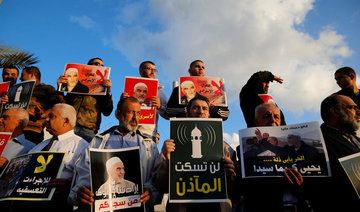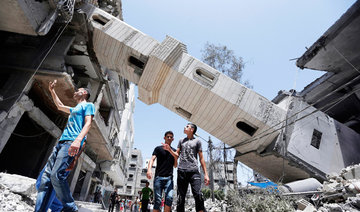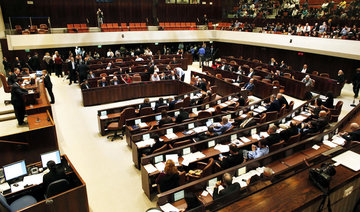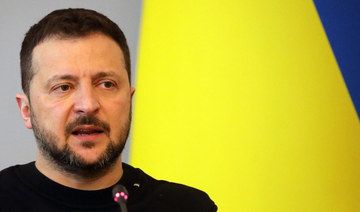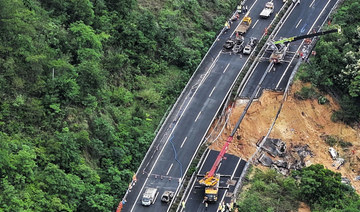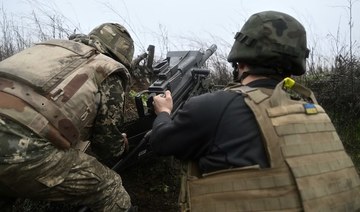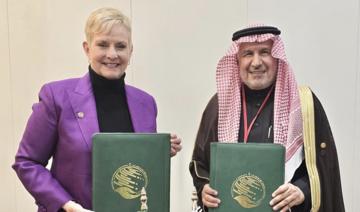JERUSALEM: Israel’s parliament gave preliminary approval Wednesday to two controversial measures that would limit calls to prayers from mosques, including one prohibiting the use of loudspeakers at all hours, after shouting matches between lawmakers.
The bills — the second of which would ban loudspeakers in urban areas between 11:00 p.m. and 7:00 am — will eventually have to be reconciled, with three more readings required before they can become law.
They were approved after a heated discussion that turned into shouting matches between ruling coalition members and Arab lawmakers, some of whom tore copies of the legislation and were ejected from the chamber.
The bills passed 55-48 and 55-47 in the Knesset, or parliament.
While the bills in theory would apply to any religious place of worship, Muslims say it is clearly meant to silence the traditional call to prayer at mosques.
The measure has become commonly known as the “muezzin law” after the Muslim official charged with calling the faithful to prayer, often through powerful speakers mounted on minarets.
The notion of Israeli legislation silencing mosques has sparked outrage around the Arab and wider Muslim world.
Supporters of the move say it is needed to prevent daily disturbance to the lives of hundreds of thousands of non-Muslim Israelis.
Last month, government ministers endorsed the softer version of the bill prohibiting loudspeakers overnight, which limits its scope to the first of the five daily Muslim calls to prayer just before dawn.
That version would apply to mosques in annexed east Jerusalem as well as Israel, but not to the highly sensitive Al-Aqsa mosque compound, Islam’s third holiest site, according to an Israeli official.
An earlier draft limiting volumes throughout the day had been rejected because it might have silenced the siren sounded in Jewish areas at sunset on Friday to mark the start of the Sabbath.
However, the stricter measure was revived by members of the hard-line Yisrael Beitenu party, part of Prime Minister Benjamin Netanyahu’s coalition, leading to Wednesday’s two votes.
It was not immediately clear if that version would apply to Al-Aqsa, located in mainly Palestinian east Jerusalem.
One of the sponsors of the less rigid bill, Motti Yogev of the far-right Jewish Home, said the proposal was “a social law that aims to enable people to sleep.”
“Loudspeakers have not been here forever, and in recent decades there are alarm clocks for whoever wants to wake up for the mosque,” he said.
Ahmad Tibi of the predominantly Arab Joint List alliance of lawmakers called the measure “a racist act.”
“This is an important Muslim religious ceremony, and (the Knesset) has never intervened in a Jewish religious event,” he said.
Opposition has not only come from Arabs and Muslims.
Israeli President Reuven Rivlin has spoken out against the move, saying existing noise pollution regulations provide a solution.
Government watchdog groups have called the measure an unnecessary provocation that threatens freedom of religion.
At Wednesday’s debate, Environmental Protection Minister Zeev Elkin said the new law was necessary since the existing rules set a low fine that causes police to disregard noise violations.
The new proposed law sets a fine of 10,000 shekels ($2,714, 2,573 euros) to transgressors.
Israeli lawmakers give initial approval to bills quieting mosques
Israeli lawmakers give initial approval to bills quieting mosques
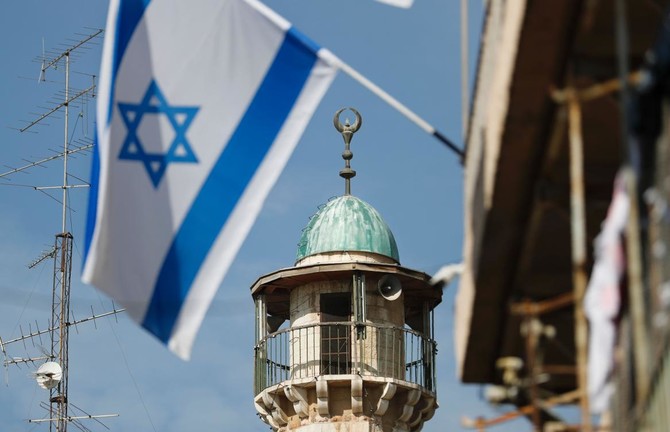
Russia puts Ukraine's Zelensky on wanted list, TASS reports
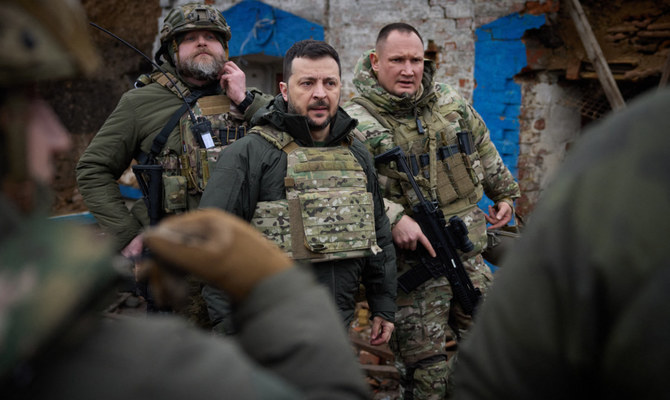
- Russia has issued arrest warrants for a number of Ukrainian and other European politicians
MOSCOW: Russia has opened a criminal case against Ukrainian President Volodymyr Zelensky and put him on a wanted list, the state news agency TASS reported on Saturday, citing the Interior Ministry's database.
The entry it cited gave no further details.
Russia has issued arrest warrants for a number of Ukrainian and other European politicians since the start of the conflict with Ukraine in February 2022.
Russian police in February put Estonian Prime Minister Kaja Kallas, Lithuania's culture minister and members of the previous Latvian parliament on a wanted list for destroying Soviet-era monuments.
Russia also issued an arrest warrant for the International Criminal Court (ICC) prosecutor who last year prepared a warrant for President Vladimir Putin on war crimes charges.
A Chinese driver is praised for helping reduce casualties in a highway collapse that killed 48
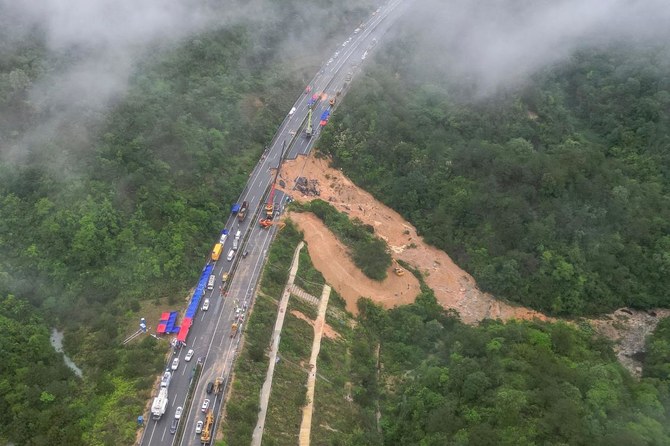
- Reacting swiftly, Wang, a former soldier, positioned his truck to block the highway, effectively stopping dozens of vehicles from advancing into danger
- His wife got out of the truck to alert other drivers about the situation
BEIJING: A Chinese truck driver was praised in local media Saturday for parking his vehicle across a highway and preventing more cars from tumbling down a slope after a section of the road in the country’s mountainous south collapsed and killed at least 48 people.
Wang Xiangnan was driving Wednesday along the highway in Guangdong province, a vital economic hub in southern China. At around 2 a.m., Wang saw several vehicles moving in the opposite direction of the four-lane highway and a fellow driver soon informed him about the collapse, local media reported.
Reacting swiftly, Wang, a former soldier, positioned his truck to block the highway, effectively stopping dozens of vehicles from advancing into danger, Jiupai News quoted Wang as saying. Meanwhile, his wife got out of the truck to alert other drivers about the situation, it said.
“I didn’t think too much. I just wanted to stop the vehicles,” Wang told the Chinese news outlet.
Wang’s courageous actions not only garnered praise from Chinese social media users but also recognition from the China Worker Development Foundation.
The foundation announced Friday that in partnership with a car company it had awarded Wang 10,000 yuan ($1,414). A charity project linked to tech giant Alibaba Group Holding also gave an equal amount to Wang, newspaper Dahe Daily reported. Wang told the newspaper he would donate the money to the families of the collapse victims.
Local media also reported that another man had knelt down to prevent cars from proceeding on the highway.
The accident came after a month of heavy rains in Guangdong. Some of the 23 vehicles that plunged into the deep ravine burst in flames, sending up thick clouds of smoke.
About 30 people were hospitalized. On Saturday, one was discharged from the hospital, state broadcaster CCTV reported. The others were improving, but one remains in serious condition.
On Saturday, the Meizhou city government in Guangdong said in a statement that authorities would conduct citywide checks on expressways, railways and roads in mountainous areas. A team led by the provincial governor is investigating the cause of the collapse, Southcn.com reported.
The Chinese government had sent a vice premier to oversee recovery efforts and urged better safety measures following calls by President Xi Jinping and the Communist Party’s No. 2 official, Premier Li Qiang, to swiftly handle the tragedy.
The dispatch of Zhang Guoqing, who is also a member of one of the ruling Communist Party’s leading bodies, illustrates the concern over a possible public backlash over the disaster, the latest in a series of deadly infrastructure failures.
Russia says it shot down four US-made long range missiles over Crimea

- The ATACMS missiles, with a range up to 300km were used for the first time in the early hours of April 17
MOSCOW: The Russian defense ministry said on Saturday its air defense forces shot down four US-produced long-range missiles over the Crimea peninsular, weapons known as Army Tactical Missile Systems (ATACMS) that Washington has shipped to Ukraine in recent weeks.
The ministry said later that Russian aircraft and air defense systems had downed a total of 15 ATACMS in the past week.
On Tuesday, Russian officials said Ukraine had attacked Crimea with ATACMS in an attempt to pierce Russian air defenses of the annexed peninsula but that six had been shot down.
A US official said in Washington last month that the United States secretly shipped long-range missiles to Ukraine in recent weeks.
The ATACMS missiles, with a range up to 300km were used for the first time in the early hours of April 17, launched against a Russian airfield in Crimea that was about 165 km (103 miles) from the Ukrainian front lines, the official said.
The Pentagon initially opposed the long-range missile deployment, concerned that taking the missiles from the American stockpile would hurt US military readiness.
There were also concerns that Ukraine would use them to attack targets deep inside Russia, a step which could lead to an escalation of the war toward a direct confrontation between Russia and the United States.
Separately on Saturday, the Russian defense ministry said that in the last week its forces had destroyed a military train carrying equipment and arms produced in the West and supplied to Ukraine by NATO.
The scale of the damage, exact date and location were not disclosed.
Reuters is not immediately able to corroborate battlefield accounts from either side.
On Thursday, British Foreign Secretary David Cameron promised 3 billion pounds ($3.7 billion) of annual military aid for Ukraine for “as long as it takes,” adding that London had no objection to its weapons being used inside Russia, drawing a strong rebuke from Moscow.
South Sudan removes newly imposed taxes that had triggered suspension of UN food airdrops
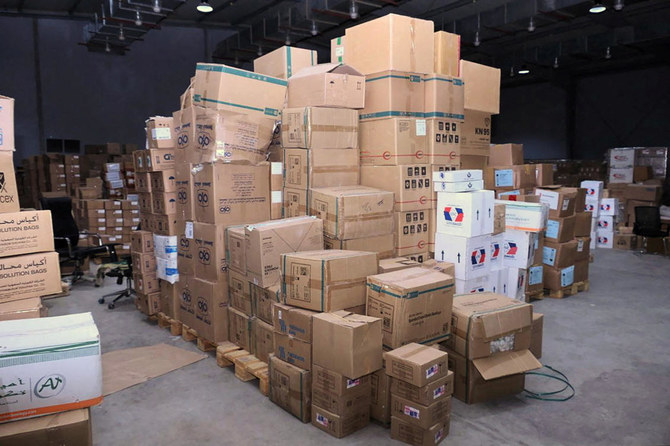
- The UN earlier this week urged South Sudanese authorities to remove the new taxes, introduced in February
- There was no immediate comment from the UN on when the airdrops could resume
JUNA, South Sudan: Following an appeal from the United Nations, South Sudan removed recently imposed taxes and fees that had triggered suspension of UN food airdrops. Thousands of people in the country depend on aid from the outside.
The UN earlier this week urged South Sudanese authorities to remove the new taxes, introduced in February. The measures applied to charges for electronic cargo tracking, security escort fees and fuel.
In its announcement on Friday, the government said it was keeping charges on services rendered by firms contracted by the UN peacekeeping mission in South Sudan.
“These companies are profiting ... (and) are subjected to applicable tax,” Finance Minister Awow Daniel Chuang said.
There was no immediate comment from the UN on when the airdrops could resume.
Earlier, the UN Humanitarian Affairs Agency said the pausing of airdrops had deprived 60,000 people who live in areas inaccessible by road of desperately needed food in March, and that their number is expected to rise to 135,000 by the end of May.
The UN said the new measures would have increased the mission’s monthly operational costs to $339,000. The UN food air drops feed over 16,300 people every month.
At the United Nations in New York, UN spokesman Stéphane Dujarric said the taxes and charges would also impact the nearly 20,000-strong UN peacekeeping mission in South Sudan, “which is reviewing all of its activities, including patrols, the construction of police stations, schools and health care centers, as well as educational support.”
An estimated 9 million people out of 12.5 million people in South Sudan need protection and humanitarian assistance, according to the UN The country has also seen an increase in the number of people fleeing the war in neighboring Sudan between the rival military and paramilitary forces, further complicating humanitarian assistance to those affected by the internal conflict.
Saudi taekwondo athlete Donia Abu Taleb wins Best Arab Achievement Award

- Taleb, the first Saudi athlete to directly qualify for the Paris 2024 Olympics, receives honor from Egyptian sports minister
- Saudi Taekwondo Federation named Best Arab Federation in recognition of its achievements both locally and internationally
RIYADH: Saudi taekwondo standout Donia Abu Taleb has been honored with the Best Arab Achievement Award at a ceremony in Cairo celebrating the achievements of Arab athletes.
About 40 athletes from Saudi Arabia, Egypt, the UAE, Tunisia, Jordan, Algeria, Qatar and Morocco were honored, along with businessmen from various Arab countries.
Egypt’s Minister of Youths and Sports, Ashraf Subhi, handed the recognition to Taleb, the first Saudi athlete to directly qualify for the Paris 2024 Olympics.
The Saudi Taekwondo Federation was also awarded the Best Arab Federation in recognition of its achievements both locally and internationally, particularly Taleb’s qualification for the Paris Olympics.
Mohammed Al-Shehri, executive director of the federation, accepted the award on behalf of the sports group.



